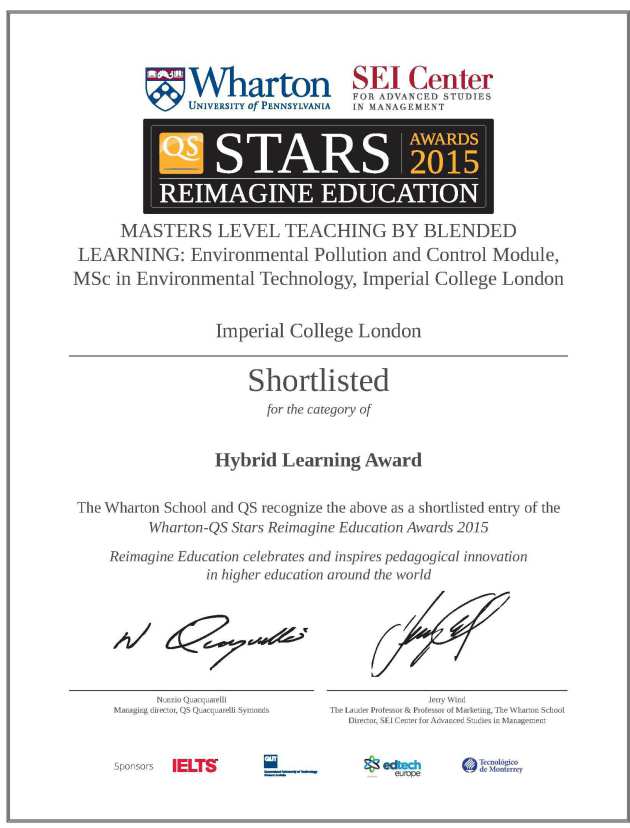Coordinator: Dr Nick Voulvoulis
Aim:
This module introduces pollution and degradation of environmental quality as an example of the interactions between natural and human systems. It aims to enable students to understand environmental problems, looking at causal linkages between pollution sources, exposure pathways and impacts to environmental quality and human health.
The complex relationships between environmental factors and human health, taking into account multiple pathways and interactions, will be assessed in a broader spatial, socio-economic and cultural context.
Students will learn how to assess pollution sources, study exposure pathways and fate, and evaluate consequences of human exposure to pollution and its impacts to environmental quality. Providing the evidence base to support decision and policy making, they should be able to evaluate the need for action to respond, (protect, mitigate or prevent), informing the process of evaluation and selection of potential alternative actions to reduce pollution risks when necessary.
Learning Objectives:
At the end of this module, students will:
- Have gained awareness of current forms of environmental pollution and an overview of both their causes and consequences to natural, economic and social systems.
- Have gained an understanding of the fundamental principles governing the interactions between those systems (i.e. transport of pollutants in the environment),
- Have been exposed to learning examples of good practice of technologies and options used to remediate reduce/eliminate pollution of the environment,
- Be able to analyse, synthesise, and evaluate evidence to understand problems in order to select control measures and techniques concerning atmospheric, water or terrestrial challenges.
Environmental Pollution and Control module overview
Learning Methods and Delivery
Learning methods provide the basic understanding of the complex cross-disciplinary issues associated with environmental problems, their identification and their resolution. As is appropriate with learning at Masters level, the emphasis is on analysis, synthesis and evaluation. Making a shift from traditional research methods and tools to systems based frameworks, the module focuses on the need to understand problems in order to assess how environmental challenges can be addressed. Blended education/Hybrid learning/Flipping the classroom, whatever one chooses to call it, this method of learning combines classroom and online materials to challenge and enhance student learning.
Active, enquiry-based learning aims to disseminate knowledge that the students can understand and apply because of the module’s interactivity and contextual basis. Preparation includes studying online material in advance, with the aim of enhancing active class time, participation and communication. Class time is spent interactively examining the context and implications of the knowledge acquired. There are three types of sessions:
- Videos provide the evidence necessary for the active classroom participation.
- Lectures provide the venue for analysis, evaluation and synthesis of data in pursuit of critical thinking. Here students are challenged to examine their assumptions and to question information. Active participation is encouraged and demanded, as are questions to the lecturer creating a debate.
- In practicals, students are given tasks and questions which are then discussed in class in order to complete their learning, increasing their confidence in the process.
Thematic areas
The module covers three thematic areas as example of environmental challenges and central to its mission is an integrated.theme, dealing with pollution issues in a wider context. As most environmental problems are interrelated, syste,s’ thinking is introduced and employed for analyzing, understanding and addressing them.
- ENVIRONMENT AND HEALTH: This theme addresses pollutants and their relationship to human health and the quality of the natural environment
- WATER MANAGEMENT: This theme focuses on current and emerging water management issues including availability/demand, drought and floods, water quality and sustainability
- RESOURCES MANAGEMENT: : The focus here is on the need to manage natural resources more sustainably, following a holistic, integrated and interdisciplinary approach.
In order to have more in-class discussion and activity time and to effectively get to higher-order learning objectives, the module champions a shift from traditional research methods and tools to system based frameworks. Moreover, it focuses on the need to understand problems before any solutions are derived, conceptualizing environmental problems as the interactions and interrelationships between natural and human systems.
 Videos provide the evidence necessary for active classroom participation. Then lectures offer the venue for analysis, evaluation and synthesis of the available data. Here students are challenged to examine their assumptions and to question information. Active participation is encouraged and demanded, with practicals designed to stimulate debate. These learning methods help increase science literacy and make it easier and faster for the 150 students each year to develop confidence in their active, enquiry-based learning. The module effectively disseminates knowledge that the students can understand and apply because of its interactivity and contextual basis. This is further supported by the module’s examination and assessment, placing greater emphasis on assessment for learning rather than assessment of learning.
Videos provide the evidence necessary for active classroom participation. Then lectures offer the venue for analysis, evaluation and synthesis of the available data. Here students are challenged to examine their assumptions and to question information. Active participation is encouraged and demanded, with practicals designed to stimulate debate. These learning methods help increase science literacy and make it easier and faster for the 150 students each year to develop confidence in their active, enquiry-based learning. The module effectively disseminates knowledge that the students can understand and apply because of its interactivity and contextual basis. This is further supported by the module’s examination and assessment, placing greater emphasis on assessment for learning rather than assessment of learning.
The Environmental Pollution and Control Module of the MSc in Environmental Technology at Imperial College London (Blended learning - Online and in an Active Classroom) was shortlisted for the Wharton-QS Stars Reimagine Education Awards 2015!
